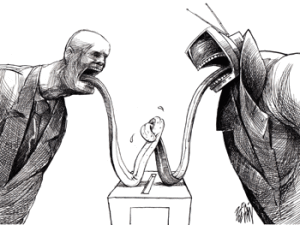Most of my Thanksgiving celebrations have been of a fairly standard variety.
Turkey and all the sides. Fellowship with family. Lots of laughs. Sometimes even some pro football watching on TV.
But I’ve got a special Thanksgiving memory I’d like to share here.
It occurred in 1989. Twenty-six years ago I had the honor of attending — along with about 20 other journalists from all over the country — a three-week journey through Southeast Asia. Our trip took us — in order — Thailand, Vietnam, Cambodia and back to Vietnam. Our delegation represented the National Conference of Editorial Writers, which has been renamed and reorganized into the Association of Opinion Journalists.
It was a marvelous experience at many levels. Just going so far from home in itself was a treat. For several of us on that trip, it gave us a chance to return to Vietnam, where we had served during that terrible war and to see a country no longer shrouded by that conflict.
But along the way, we ventured to Cambodia. In 1989, the country was just beginning to recover from decades of war. Phnom Penh, the capital city, was in shambles. Vietnamese forces had just evacuated the country after liberating Cambodia from the heinous rule of Pol Pot and the Khmer Rouge. The city’s infrastructure was decimated.
We spent several days in Cambodia, laying eyes on a notorious killing field and seeing up close a former prison where the Khmer Rouge tortured and killed their countrymen.
But then the Cambodia portion of the trip ended. It happened to be Thanksgiving Day when we boarded our vans and headed east, back to Ho Chi Minh City (which the locals still refer to as Saigon).
We traveled all day along a terrible road. We crossed the rapidly flowing Mekong River aboard a “ferry” that in reality was little more than a glorified raft.
After a grueling day of travel back to Saigon, we settled into our hotel, the Majestic. Then we were informed by the hotel staff that they had prepared a special meal for us.
They wanted to make us feel a bit more “at home” by serving us a Thanksgiving-style meal in the hotel’s main dining room.
We all sat down to dinner that evening and enjoyed a serving of what one of my dear friends refers to this day as “road kill duck”; we also enjoyed some fresh peas and mashed potatoes.
The meal was just OK.
What made it so very special, though, was the hospitality displayed by our Vietnamese hosts, who were delighted to treat us to a meal that enabled their American visitors commemorate a uniquely American holiday.
A day that began with some trepidation as we looked forward to a long, tiring and potentially harrowing trip back from a nation still bleeding from the wounds of war ended with warmth and good wishes — in a place so far from home.



